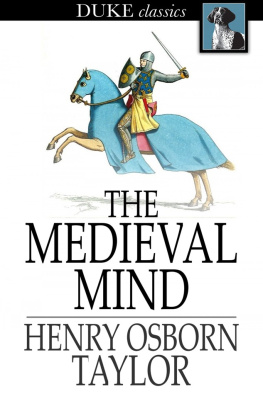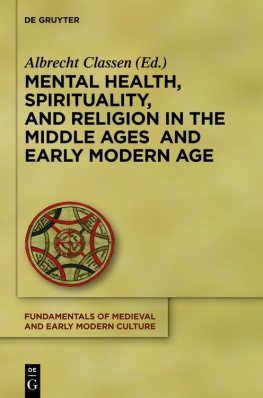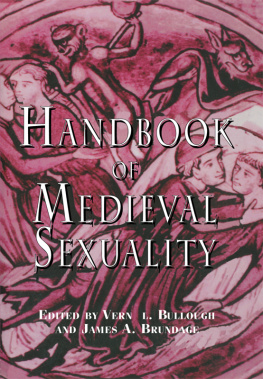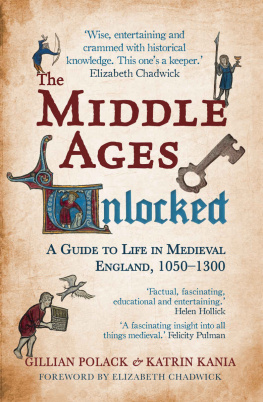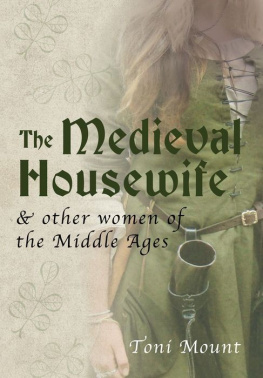ROUTLEDGE LIBRARY EDITIONS: THE MEDIEVAL WORLD
Volume 14
MEDIEVAL MINDS
MEDIEVAL MINDS
Mental Health in the Middle Ages
THOMAS F. GRAHAM
First published in 1967 by George Allen & Unwin Ltd
This edition first published in 2020
by Routledge
2 Park Square, Milton Park, Abingdon, Oxon OX14 4RN
and by Routledge
52 Vanderbilt Avenue, New York, NY 10017
Routledge is an imprint of the Taylor & Francis Group, an informa business
1967 George Allen & Unwin Ltd
All rights reserved. No part of this book may be reprinted or reproduced or utilised in any form or by any electronic, mechanical, or other means, now known or hereafter invented, including photocopying and recording, or in any information storage or retrieval system, without permission in writing from the publishers.
Trademark notice: Product or corporate names may be trademarks or registered trademarks, and are used only for identification and explanation without intent to infringe.
British Library Cataloguing in Publication Data
A catalogue record for this book is available from the British Library
ISBN: 978-0-367-22090-7 (Set)
ISBN: 978-0-429-27322-3 (Set) (ebk)
ISBN: 978-0-367-19184-9 (Volume 14) (hbk)
ISBN: 978-0-429-20093-9 (Volume 14) (ebk)
Publishers Note
The publisher has gone to great lengths to ensure the quality of this reprint but points out that some imperfections in the original copies may be apparent.
Disclaimer
The publisher has made every effort to trace copyright holders and would welcome correspondence from those they have been unable to trace.
MEDIEVAL MINDS
MENTAL HEALTH IN THE MIDDLE AGES
THOMAS F. GRAHAM, Ph.D.
Preface by
robert b. macleod ph.d.
Professor of Psychology, Cornell University
FIRST PUBLISHED IN 1967
This book is copyright under the Berne Convention. Apart from any fair dealing for the purpose of private study, research, criticism or review, as permitted under the Copyright Act, 1956, no portion may be reproduced by any process without written permission. Enquiries should be addressed to the publisher.
George Allen & Unwin Ltd 1967
PRINTED IN GREAT BRITAIN
in II pt. Bell Type, two pt. leaded
BY T. & A. CONSTABLE LTD.
Thence to Saint Fillans blessed well
Whose spring can frenzied dreams dispel
And the crazed brain restore.
WALTER SCOTT
Saint Valentine, besides
To such as does his power despise
The falling sickness, sends,
And helps the man that to him cries.
THOMAS NEOGORGUS
Thomas Carlyle said, History is the essence of innumerable biographies. This may not be a prescription for all histories of science, but for the historian who would tell the story of mans quest for self-understanding, the advice is sound. With a certain amount of ingenuity it is possible to present the history of mathematics and the physical sciences as an orderly progression from ignorance to wisdom, each new set of discoveries serving as supports for the still newer discoveries of a succeeding generation.
If we schematize the history of physical theory since the seventeenth century, we can see how the achievements of che nuclear age would have been impossible without an earlier mastery of simpler and cruder principles of electrical transmission and mechanical causation. Thus in a limited sense we may say that the data with which the scientist works are the accomplishments of his predecessors. But only in a very limited sense. No really great scientist has been a mere builder on the accomplishments of others. Isaac Newton could draw both facts and insights from Galileo, and Hermann Helmholtz could extend the work of Johannes Mller, but it was the genius of each to see familiar facts in a new and larger context. The men who have led the forward march of science have been, more often than not, challengers of tradition rather than conformists. And here is where the human side of history becomes important. Behind the apparently orderly progression from discovery to discovery is the story of living human beings whose restless curiosity has led them to re-examine old assumptions and to take a fresh look at familiar facts. It may be that in our study of the history of science we can learn as much from the story of the scientist as we can from a catalogue of his accomplishments.
This is true of the history of the science of man. To try to write the history of psychology as a succession of forward steps would be a misguided effort. Psychologists have not in orderly fashion been building insight upon insight. Similar to the newborn child, whose parents skills are not inherited, the psychologist of each generation must grapple afresh with the problems of living and through his own experience arrive at insights which for him are meaningful. In a negative sense, perhaps, there has been progress in psychological thinking. Some of the more crippling superstitions of the past have been overome, and some of the more egregious errors of our forefathers can be quickly recognized and dismissed. This is no guarantee, however, that thinking can now proceed without constraint or bias. The implicit assumptions of today may tomorrow be scorned as twentieth-century superstitions, and yesterdays psychological insights may within their own framework be as profound as those of today.
If we set aside the notion that the history of psychology must reveal progress from ignorance to wisdom, why then should we continue to study history? There are many answers, the most telling of which lies in the uniqueness of psychologys subject marter. The data of psychology, unlike those of the physical sciences, are in essence the same for twentieth-century man as they were for Aristotle. They are the phenomena of what used to be called the human mind, and the first steps towards a psychology are taken when one begins to be curious about human experience. At different times and in different places people have observed, described and conceptualized experience in different ways. The attempt to recreate the human problem as it has been seen through other eyes is often a humbling experience, revealing the poverty of our own observation and the barrenness of our theorizing. This is not to suggest that the psychologist of today should discard his theoretical models and to return to Aristotle; in fact he will gain little from Aristotle if he is not himself in active search of a theory. He will be a better psychologist, however, if he realizes that the passage of centuries does not necessarily diminish the value of a psychological insight.
Thomas F. Graham has been exploring the highways and the byways of the Mental Health movement for some years. He has searched and researched in an area that is too often neglected by the academic historians of psychology. It is an area that contains a fascinating story, for many of the subjects are complex and puzzling people. Quite apart from its human appeal, however, it is essential to an understanding of mans conceptions of himself and of his relations to the world around him. In this little book, the author covers the period from the second century to the budding of the scientific Renaissance, a period during which mans conception of the good and healthy life was part and parcel of his theology. We think of the medieval ideas as primitive in comparison with those of the Greeks or of ourselves. Yet anxiety and fear, guilt and hatred are the same, even though clothed in varied guises, and the ways in which people in different cultural settings have coped with them are illuminating as well as interesting. Dr Graham gives us glimpses into the recesses of scores of medieval minds, glimpses which invite us to further study and reflection.


